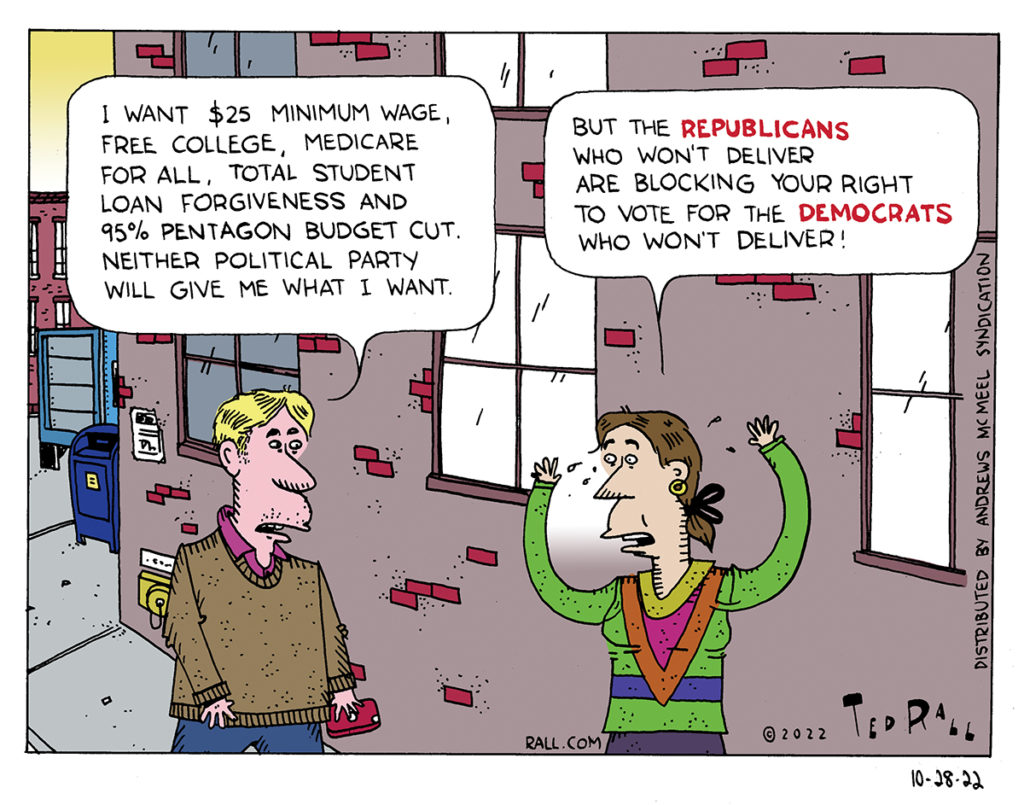
When Gallup pollsters ask Americans what causes them the most stress and worry, personal economic concerns—the cost of living, lack of money, the gap between rich and poor, difficulty finding a job or, if they’re employed, low wages—consistently come in first, so much so that they can’t imagine saving for the future. General economic issues like poverty, hunger and homelessness come in next. In a capitalist country with decades of rising income inequality and a modest safety net, these findings come as little surprise.
The rent is too damn high; buying a house gets more and more out of reach. We’re living paycheck to paycheck, expenses rise faster than salaries, and bosses, who can fire you at will even if you’ve been working hard and following the rules, have absolute power in a country where 10% of workers belong to a union. No wonder we’re worried sick.
Economic insecurity is America’s biggest political issue. Yet neither of the major parties campaigns on it. At most, they’ll refer to it obliquely, as when nativists call for reduced immigration—sometimes they argue that new arrivals take away jobs from the native-born.
Many of the other things that keep people up at night are partly or fully grounded in economic insecurity. Crime and violence are more pervasive in poor neighborhoods, courts are better-staffed and more efficient in wealthy areas. Patients worry about being able to afford to see a doctor and pay for medications at least as much as they do about the quality of healthcare. Racial tensions dissipate in places and periods of prosperity.
The failure of bourgeois electoral democracy to address the nation’s biggest political issue, economic insecurity, is tailor-made for the agenda of the Left, which historically has been grounded in Marxist class analysis.
Naturally, the ultimate goal of Leftists is the overthrow of capitalism, which centers inequality and monopoly as inevitable at best and laudable at worst, with a socialism that provides equal access to the basic necessities of life and equal opportunity to achieve more. But Revolution is not like a cake; there is no recipe to follow. All the conditions must be ripe and, frustratingly to the revolutionist, the determination that those conditions exist can only be affirmed after the fact of success.
One predicate for revolution is a well-organized grassroots movement. There are few better ways to build such a structure than to consistently and relentlessly agitate for improvement in people’s economic living conditions—which are, after all, their biggest problem—in elections, street demonstrations, strikes, sit-ins, sabotage and other militant actions centered around a Left programme that demands improvements in wages, benefits and government safety-net programs.
Never has the public been more predisposed to the argument that government ought to intercede on behalf of those who are having trouble making ends meet, or fear that unemployment might put them into such a position. People’s buying power has been ravaged by inflation, corporations are again turning the screws after a brief period of liberalization driven by the post-pandemic labor shortage, and it has been 60 years since a major party proposed a federal anti-poverty program (LBJ’s Great Society).
Some bourgeois political analysts, particularly the progressive wing of the Democratic Party, identify the vacuum in the dialogue space of economic injustice. But neither party can meaningfully address issues like poverty and homelessness for one simple reason: they are capitalist parties. Whatever room existed for the reformist impulse vanished after the postwar period yielded to the beginning of America’s late-capitalist decline. Admitting that capitalism leaves millions behind is unthinkable, let alone developing legislative attempts to fix the problem.
We, the Left, have the signature issue of economic justice all to ourselves, provided that we do not obsess over identity politics to the exclusion of class divisions.
Wages come first.
A day’s work should pay enough to pay for rent, a car and other necessities. If the federal minimum wage had kept up with inflation since 1970, it would currently be $30 an hour. The average worker is twice as productive as 1970, so make that $60. For a full-time worker, that’s $120,000 a year. But 1970 wasn’t a perfect time for workers. We deserve and demand better. The Left should think of $60 an hour as the bare minimum necessary to live decently in the United States, and push for more for skilled labor.
Think that’s unrealistic? If so, you’ve been corrupted by capitalistic propaganda that devalues labor. Bernie Sanders and the Squad are still struggling to raise the federal minimum from $7.25 to $15.00—that’s what passes for progressive! What a joke! The bosses themselves consider $60 an hour to be the real minimum wage to subsist in the world we live in today; in New York, where I live, you can’t qualify for a rental apartment unless your annual salary is 40 times the monthly rent. You need $120,000 to be considered for a $3000 per month apartment; good luck finding anything for less than that. It’s not that landlords want to discriminate against working-class tenants. They’ve learned from experience that people who earn less than $120,000 are far likelier to fall behind on the rent until they have to be evicted, costing building owners and managers money.
Be reasonable. Demand the impossible: $60 an hour minimum wage.
Next: the Left’s programme for economic security.
(Ted Rall (Twitter: @tedrall), the political cartoonist, columnist and graphic novelist, co-hosts the left-vs-right DMZ America podcast with fellow cartoonist Scott Stantis. You can support Ted’s hard-hitting political cartoons and columns and see his work first by sponsoring his work on Patreon.)
